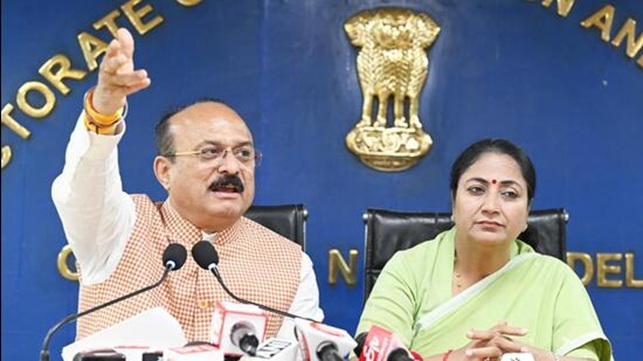
New Delhi, Apr 30: The Delhi Cabinet on Tuesday approved the draft of the Delhi School Education (Transparency in Fixation and Regulation of Fees) Bill 2025, a legislation that Chief Minister Rekha Gupta called a “bold and historic” attempt to rein in arbitrary fee hikes by private schools.
Delhi CM Rekha Gupta and Education Minister Ashish Sood address a press conference on the bill & will be applicable to all 1,677 private unaided schools in Delhi and introduces three major reforms in the city’s fee regulation regime.
It envisages a three-tier fee regulation structure involving committees at the school, district, and state levels, which will institutionalize parental participation in the process.
Each school will now have a School-Level Fee Regulation Committee comprising parents, giving them direct decision-making power. District and state level committees will handle appeals and ensure fairness,” Rekha said.
The second major reform introduces stiff penalties for non-compliance. Schools found violating the provisions such as raising fees without approval can be fined between ₹1 lakh and ₹10 lakh & Repeat offenders could lose government recognition altogether.
For too long, private schools raised fees at will. This bill ends that. No one will be allowed to act arbitrarily anymore,” the Chief Minister said.
It added that the Director (Education) shall have the power to effect recovery of fine /penalty by one or more of the following modes, namely:-
(a) attachment and sale of the movable or immovable-property of the School Management; (b) taking possession of property over which security interest is created or any other property of the school management and appointing receiver for such property and to sell the same; (c) appointing a receiver for the management of the movable or immovable properties of the School Management; (d) any other mode of recovery as may be prescribed by the Government.
The third reform spells out the parameters that must be considered while determining fees. These include the school’s location, quality of infrastructure, academic performance, and need for funds. The idea is to bring consistency and transparency to what has long been an opaque and disputed area. Section 8 of the bill read:-
“The following factors shall be considered while deciding the fee leviable by a school, namely:- (a) the location of the school: (b) the infrastructure made available to the students for the qualitative education, the facilities provided and as mentioned in the prospectus or web-site of the school; (c) the education standard of the school as the Government may prescribe; (d) the expenditure on administration and maintenance as the Government may be prescribed from time to time, Delhi Education Minister Ashish Sood said.
He added that the draft bill prohibits fee hikes without government permission and ensures that all decisions are made in consultation with stakeholders. “Section 14 of the Act empowers the Director of Education to inspect records, accounts, and documents of any school and take necessary action,” he said.
The move comes weeks after widespread protests by parents across Delhi alleging arbitrary and excessive fee hikes by private schools. Following these demonstrations, the Directorate of Education on April 16 launched action against several unaided schools, initiating proceedings for de-recognition and possible government takeover.
According to CM Gupta, the new law will provide parents with both clarity and confidence. They will no longer have to plead for answers or relief. This law will empower them to make informed choices about their children’s education, with fee structures decided well before the academic year begins,” she said.
Under the proposed timeline, schools must form their School-Level Committees by July 15. These bodies will submit their fee proposals by July 31, with final decisions to be taken by September 15.
If no further suggestions are made, the proposal will move to the district-level committee by September 30. Parents will know the fees by October and have time to consider their options,” Gupta said.
The Chief Minister also said that many parents had been “used for political interests in the past,” but the new system will end that. This will put real power in their hands, she said.
|